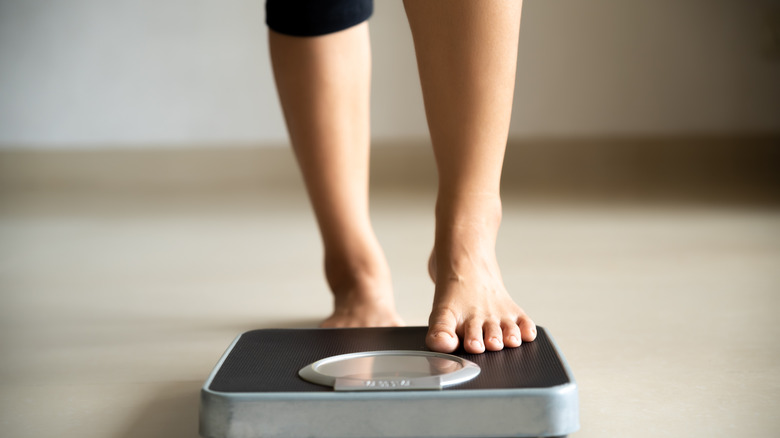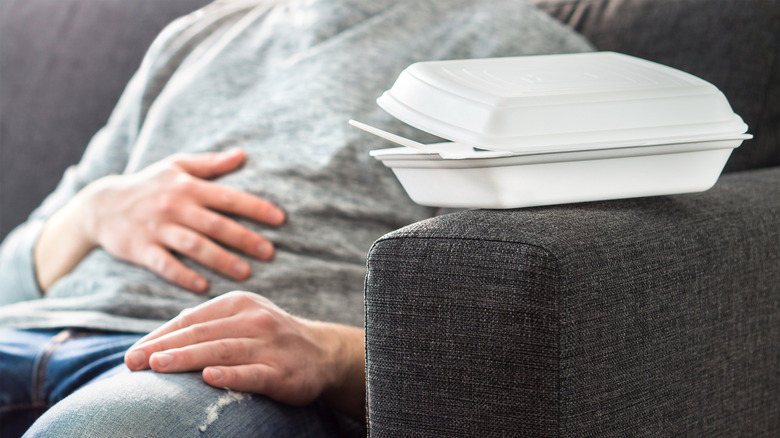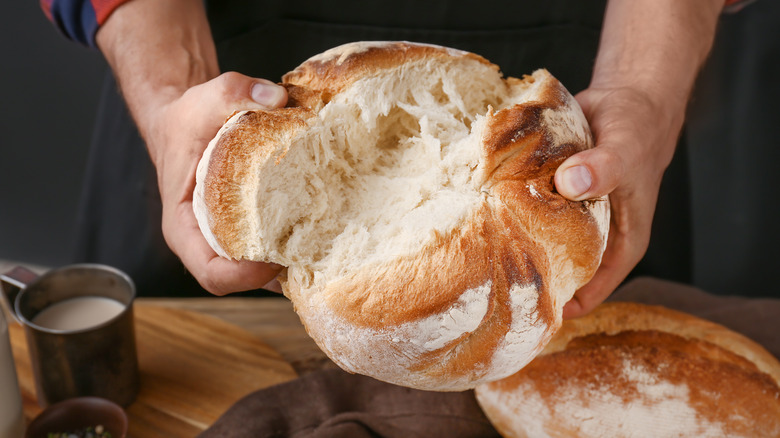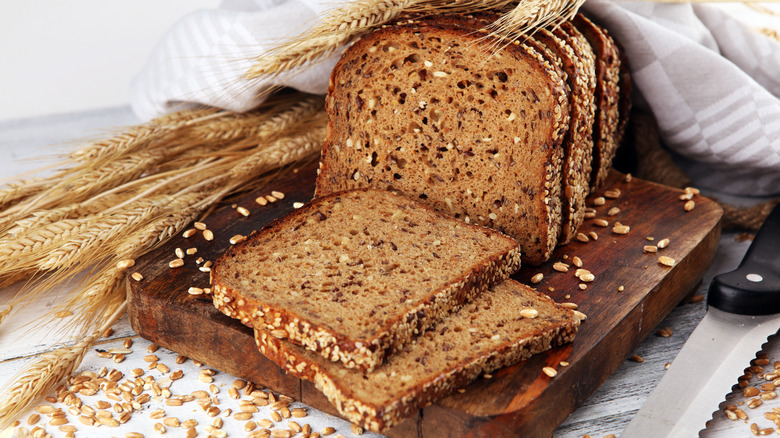What Happens To Your Body When You Eat Bread Every Day
If you're like most people, you love to eat bread. According to Statista, 9.77 million Americans bought five or more loaves or packages of bread in 2020. There's just something about the fluffy freshness of it that fills you with joy and makes you satisfied. Whether it is a tasty sandwich, a cheesy pizza, a juicy burger, a breakfast bagel, or an avocado toast, that bread base is everything. But while there are a lot of health benefits that bread provides (beyond its deliciousness), there are also a number of downsides to eating bread every single day. It can be fine in moderation, of course, but it can also take a toll on your health if you eat too much of it.
So before you reach for that extra slice, take a moment to read how bread affects your physical and mental health. Without further ado, here are some of the surprising ways eating bread every day can impact you.
Bread can lead to break outs
If you're noticing a number of breakouts, one of the first things that a dermatologist may ask you about is your diet. Are you eating a lot of bread? Perhaps on the daily? That may just be the culprit. "Diet and acne have been controversial, but recent research shows that diet can play a significant role in acne development," cosmetic dermatologist Michele Green told Eat This, Not That. "People with acne tend to consume more refined carbohydrates than people with little or no acne." According to the dermatologist, this includes foods that are "rich in refined carbohydrates include bread, crackers, cereal, pasta (all made with white flour), white rice, noodles, sodas, sweetened beverages, cane sugar, maple syrup, and honey or agave."
This may be because your body absorbs refined carbohydrates quickly, which rapidly raises your blood sugar levels and, as such, your insulin levels (via Healthline). It may be worth cutting back on your bread intake if you do notice some skin problems.
Bread can cause weight gain
You have probably heard it before, though research is indeed conflicting: Bread can cause weight gain, according to Healthline. We're talking about white bread, in particular. This is because white bread, specifically, is very refined and, most of the time, it contains significant amounts of added sugar. In fact, one study of over 9,000 people published in BMC Public Health found that eating just two slices of white bread (or the equivalent of 120 grams) per day is linked to a 40% increased risk of weight gain and obesity. So there you have it.
While the right kinds of carbs are good for you in moderation, like all nutrients, you should definitely be careful about how much of them you consume. Or, if you are going to eat bread (because, let's be honest, who can really give it up?), perhaps trade in the white bread for a more nutritious kind.
Bread may boost your blood pressure
Bread may taste amazing, but it may also boost your blood pressure, according to a study published in the journal, Nutrients. So you have to be careful with your consumption rate if it is on the more frequent end of the scale. According to the study, bread products are one of the main sources of daily sodium intake, which is associated with elevated blood pressure. And elevated blood pressure can be dangerous.
If left untreated, high blood pressure can lead to a number of problems like heart attacks, strokes, heart failure, kidney disease or kidney failure, vision loss, sexual dysfunction, angina, and peripheral artery disease (PAD), which can cause a narrowing of the arteries in your legs, arms, head, and stomach, according to the American Heart Association. But lifestyle changes like exercising and, yes, unfortunately, cutting back on bread can help you to maintain healthy blood pressure.
Is bread harming your mental health?
It's no secret that bread can make you feel really great in the moment. Who doesn't love some warm, freshly baked, and buttered bread? It's the best comfort food that there is, point blank period.
Nevertheless, too much bread can have adverse effects and lead to depression. According to a study published in Frontiers in Human Neuroscience, bread is an "edible agent of mental disease." According to the research, "bread (1) makes the gut more permeable and can thus encourage the migration of food particles to sites where they are not expected, prompting the immune system to attack both these particles and brain-relevant substances that resemble them, and (2) releases opioid-like compounds, capable of causing mental derangement if they make it to the brain." Although not everyone agrees, the researchers in this particular study went so far as to say that a grain-free diet could improve the mental health of many people.
Bread can cause gas
Ever feel totally bloated and gassy after eating a good ole' sandwich? How about after a hefty hunk of beef on some seriously fluffy burger buns? We hate to break it to you but it may very well be the bread that's causing all those issues. According to Healthline, processed foods like breads contain a lot of ingredients, including lactose and fructose, which can cause gas to build up. So the more you eat bread, the bubblier your stomach may get.
If you are going on a date or, you know, just about anywhere out in public, you may want to be mindful of the food choices you are making — unless, of course, you don't mind a green cloud following you. Yes, eat too much bread and other processed foods and you increase your likelihood to be stinking up a storm. And no one wants that, we promise.
Certain breads are linked to lower cholesterol
Contrary to popular belief, bread is not all bad! According to a study published in ARYA Atherosclerosis, oat bread, in particular, has an advantage. "Oat bread consumption could significantly reduce total cholesterol," the report reads.
"According to the American Heart Association, your body makes all the cholesterol you need and circulates it through your bloodstream. Cholesterol is found in the structure of all cells in the body," the University of Iowa explained. "It helps digest fat and produce vitamin D and hormones such as testosterone and estrogen." It's worth noting that there are two types of cholesterol: high-density lipoprotein (HDL), aka "good" cholesterol, and low-density lipoprotein (LDL), aka "bad" cholesterol. The latter can narrow your blood vessels and lead to heart disease.
Thankfully, though, oat bread is here to help."Since hypercholesterolemia is a proven risk factor for endothelial dysfunction [a type of heart disease], hypercholesterolemic patients can hence be advised to eat oat bread," the aforementioned study concluded.
Eating white bread can make you sleepy
Ever notice that you feel totally wiped out after eating a carb-heavy meal like a big pizza or a huge sub sandwich? Eating too much white bread can make you tired as it causes your blood sugar to spike and crash (via Livestrong).
However, if you find you're still fatigued after switching to whole grains, you could just have gluten sensitivity, according to Harvard Health Publishing. Austin, Texas-based clinical nutritionist Lauryn Lax told Livestrong, "A gluten sensitivity or reaction can happen anywhere, from within minutes to several days after [consumption]." She added that the people who are "extremely sensitive" to gluten can experience flare-ups or attacks on their immune systems for up to two months after just one exposure. If you find that you feel especially tired after eating gluten-ridden foods like bread, it may be worth talking to your doctor about a potential sensitivity to gluten.
Whole-grain bread can provide you with stable energy
While some bread (we're looking at you, white bread) can make you feel lethargic, other bread (we're looking at you, whole grain bread) can give you an energy boost, according to The Nutrition Source, a Harvard publication.
"Whole grains offer a 'complete package' of health benefits, unlike refined grains, which are stripped of valuable nutrients in the refining process," explained the site. "A growing body of research shows that choosing whole grains and other less-processed, higher-quality sources of carbohydrates, and cutting back on refined grains, improves health in many ways."
One of those ways is by providing you with "sustained energy" so you can feel empowered to tackle your day (via American Academy of Nutrition and Dietetics). That's why a slice or two of whole-grain toast can be really great for breakfast, for example. If you are going to eat bread in the morning, skip the plain white bagels or toast and opt for whole grain.
Eating bread may help you live longer
According to a 2020 study published in JAMA Internal Medicine, you should probably eat all of the bread you can get your hands on if you want to live a long life. Okay, okay, that's not exactly what was found. Nevertheless, the research purports that bread may indeed increase your longevity. But what do we really mean?
The protein in some plant-based foods (which, yes, includes bread and even pasta) has been linked to a lower risk of dying early. Of course, eating more plant-based foods is just one way to add years to your life. Exercising, quitting smoking, and practicing good sleep hygiene are also worthwhile endeavors (via NIH News in Health).
The average life expectancy is 78.7 years, according to the Centers for Disease Control and Prevention. "We've had a significant increase in lifespan over the last century," Dr. Marie Bernard, deputy director of the NIH's National Institute on Aging, confirmed to News in Health. "Now if you make it to age 65, the likelihood that you'll make it to 85 is very high. And if you make it to 85, the likelihood that you'll make it to 92 is very high. So people are living longer, and it's happening across the globe."
Whole-grain bread can help you get your fiber and other nutrients
Sure, there are a lot of reasons why you should probably cut back on how much processed bread you eat. But whole-grain bread, in particular, is a great source of fiber and other nutrients (via Medical News Today).
"We have conducted several meta-analyses on whole-grain consumption and health outcomes like type 2 diabetes, cardiovascular disease, cancer, and premature mortality," Dagfinn Aune, a postdoctoral researcher at the School of Public Health at Imperial College London, told Quartz. "When looking at specific sources of grains, whole-grain bread, whole-grain breakfast cereals, brown rice, and wheat bran were all associated with reduced risks."
Interestingly, Aune's research, which was published in The BMJ, found that eating the equivalent of 7.5 slices of whole-grain bread every single day is ideal for one's health — quite the opposite of what we often hear. Since the benefits appear to come from the nutrients in whole-grain bread, you won't be able to achieve the same benefits by eating white bread.











